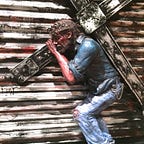Work of Taking Responsibility is Vital for Jesuit Institutions
By Tim Dulle, Jr.
What does it look like when Jesuit colleges and universities endeavor to take responsibility for acknowledging and potentially repairing the damage done by clerical sexual abuse, both on their campuses and beyond?
To explore this question, a group of about 75 students, faculty, and staff, mostly with connections to Jesuit higher education, convened at Fordham University in April. The conference represented the high point, though not the conclusion, of the grant-funded initiative, “Taking Responsibility: Jesuit Institutions Confront the Causes and Legacy of Clergy Sexual Abuse,” jointly conducted by Fordham’s Department of Theology and the Curran Center for American Catholic Studies.
Since 2020, Taking Responsibility has sponsored research teams at U.S. Jesuit institutions and hosted numerous public panels focused on broadening scholarly lenses applied to the crisis, especially toward beginning to unearth the particular dimensions of the crisis among thus-far-understudied groups, including Black, Asian/Pacific Islander American, Latinx, and Native American communities.
April’s gathering offered the first chance for sponsored researchers to discuss their work, the challenges they’ve faced, and their tentative findings. Moreover, due to the difficult nature of the subject matter and the institutional intransigence many teams have dealt with, the conference offered a chance to support one another, develop sustaining relationships, and strategize about overcoming various common obstacles. Attendees described the weekend as both “intense” and “inspiring,” and as “a moment of truth, healing, and justice for many victims who have been silenced and mistreated.”
Few definitive answers to the challenge of how to take responsibility are available, but trends have begun to emerge, and seeds have been planted.
In the conference’s keynote panel, criminologist Karen Terry provided hard data on the abuse crisis. Gerard McGlone, S.J., who offered his perspective as a survivor of abuse, a Jesuit, and a clinical psychologist, implored the audience to continue listening to survivors to develop better data, and foregrounded the necessity of expressing moral outrage. Paul Elie, who has written about his own abuse by a Fordham Jesuit, emphasized the simple-but-difficult, ongoing need to “say what happened” more honestly and openly. Donna Freitas, author of Consent: A Memoir of Unwanted Attention, invited the audience to participate in “the ongoing project of [her] own survival,” remaining open to the parts of her story she was “taught to hide, upon pain of lawsuits.” Maka Black Elk, executive director for truth and healing at the Jesuit-run Red Cloud Indian School in South Dakota, delved into the importance of understanding how sexual abuse and systemic injustice create intergenerational trauma that affects entire communities, and offered a concrete call for institutions to open their archival holdings to researchers.
Other panels were not open to the public due both to ongoing COVID-19 restrictions and to the in-progress nature of the research. One plenary featured international experts including Hans Zollner, S.J., John Guiney, S.J., and Tina Campbell on safeguarding in Jesuit institutions. A second, with Michelle Wheatley, Stephanie Russell, and Sandra Racionero-Plaza, lifted up the experience of women in leadership at Jesuit institutions, filling roles previously held mostly by ordained men.
At least three major emphases began taking shape through conversations undertaken over the course of four days. First and foremost was the need to prioritize, far more than has been the case, the voices of victim-survivors and concern for their stories in all aspects of our response to the crisis.
Beyond this, participants repeatedly came back to two areas for further research: the sexual abuse by clergy of adults, and clergy sexual abuse in non-white communities. Though the abuse of children has generally been foregrounded in studies of clergy abuse, many participants noted that abuse of adults is similarly prominent, but far less well known or understood and should be of particular concern for institutions whose students, faculty, and staff are primarily adults.
Similarly, building on discussions begun at Gonzaga University’s Taking Responsibility-funded conference in March 2022 (which theologian Dan Horan, O.F.M., wrote about here), researchers are working to shed light on the history of clergy sexual abuse in BIPOC communities, noting that scholarship on the crisis has too-often failed to account for the particular ways that structural injustices and inequalities have made these communities vulnerable to predators, many of whom have been removed from other positions and given access to poor or non-white Catholics, who are then deemed unreliable reporters by those who hold power in church settings.
The work of Taking Responsibility will conclude later this year. Among the deliverables from research projects will be a collection of resources for administrators, staff, faculty, and alumni related to the history, causes, and legacy of clergy sexual abuse.
The hope is that these resources, once available, will empower Jesuit colleges and universities to commit themselves to taking responsibility for clerical sex abuse over the long haul and to ensure that part of the enduring legacy of clerical sex abuse, both on our campuses and beyond them, is a commitment to a level of honesty and moral clarity that is fitting for Jesuit institutions.
Tim Dulle, Jr., is a theologian and historian of U.S. Catholicism and is a postdoctoral associate with Taking Responsibility. He earned degrees from Rockhurst University, Boston College, and Fordham University.
